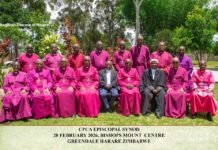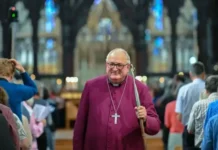Global South Fellowship Of Anglican Churches (GSFA)
Are We Really A Communion?
By The Most Rev. Dr. Mouneer Hanna Anis Archbishop Emeritus, Honorary Adviser, GSFA
Over the decades, and on many occasions, we Anglicans gave thanks to God for the ‘gift of the Anglican Communion’. Yes, we saw the Communion as ‘a gift’ because we enjoyed being a family of churches. A global family of Anglican churches of diverse nations, living in different countries, speaking a variety of languages and yet we are in full communion with each other.
We Anglicans are unique, being both ‘reformed and catholic’ upholding the faith we once received from Christ through the Apostles and Saints. The Word of God, the Creeds, the Sacraments and the Episcopal Ministry united us into one communion [1]. Right from its beginning, the Bishops of the Communion were keen to make its nature ‘autonomous and interdependent’. This was very clear in Recommendation 7 of Lambeth Conference 1878 [2]
“…. And, while they consider that such large elasticity in the forms of worship is desirable as will give wide scope to all legitimate expressions of devotional feeling, they would appeal, on the other hand, to the apostolic precept that “all things be done unto edifying,” and to the Catholic principle that order and obedience, even at the sacrifice of personal preferences and tastes, lie at the foundation of Christian unity, and are even essential to the successful maintenance of the faith.”
The principle of the ‘Mutual Responsibility and Interdependence’ was further affirmed by Resolution 67 of 1968 Lambeth Conference [3] that states:
(a) The Conference records its gratitude for the concept of mutual responsibility and interdependence in the Body of Christ, and for the renewed sense of responsibility for each other which it has created within our Communion.
It is clear from this Resolution that interdependence is kept at the heart of the Communion. Indeed, without such affirmation of interdependence between the Anglican Churches (Provinces), it would be difficult to call them a family of Churches, or a Communion. In his first letter to the church in Corinth, the Apostle Paul wrote about the importance of interdependence
between the various members of the church giving the example of the interdependence of different organs of the human body. [4]
When the members of the body lose their interdependence, the person suffers from a condition known as ‘ataxia’, which is manifested by uncoordinated movement, loss of balance, visual difficulties, problems with speech, and other signs and symptoms of dysfunctionality and disunity.
I am deeply saddened to say that the Anglican Communion we have loved, though it has kept its name, yet has lost its heart; which is the interdependence. Provinces taking unilateral decisions without consideration ‘how it might harm the mission of other Provinces’, or how it might cause divisions, or disruption of fraternal relations with other provinces.
None of us forget the appeal made by the Anglican Primates during their meeting in 2003 in regard to the consecration of Gene Robinson in The Episcopal Church USA (TEC) [5]:
“If his consecration proceeds, we recognise that we have reached a crucial and critical point in the life of the Anglican Communion and we have had to conclude that the future of the Communion itself will be put in jeopardy. …. This will tear the fabric of our Communion at its deepest level and may lead to further division….”
When TEC ignored that appeal and went ahead with its unilateral decision to consecrate the practicing gay Gene Robinson as bishop, our mission here in Egypt within the Islamic world was badly affected in the following way:
- The Grand Imam of Al Azhar cancelled the participation of Al Azhar delegates in our annual meeting of the Anglican Communion-Al Azhar Interfaith Commission that was supposed to meet in October 2003 in New York. The Archbishop of Canterbury then, Dr. Rowan Williams asked me to explain to the Grand Imam that Lambeth Resolution 1,10 represent the official teaching of the Communion in regard to human sexuality.
- The Oriental Orthodox Family of Churches decided to suspend the ecumenical dialogue with the Anglican Communion.
- We struggled as a minority church in the Middle East because of the critical media reports which spoiled and soiled our reputation. We had to produce statement after another to clarify that we uphold the biblical teaching in regard to human sexuality.
- Quite a few members of our parishes left the church because of the TEC unilateral decision.
- We received harsh criticism in several regional interfaith conferences. We did not suffer as a minority, but we suffered because we are perceived as promoting immorality.
At the Communion level, several Provinces responded to the TEC unilateral decision by other unilateral decisions, crossing the boundaries and creating bodies within the USA to provide oversight to the orthodox Anglican who rejected such innovations in the traditional Anglican faith and practice. Churches and movements like AMiA [6], CANA [7], GAFCON [8] and ACNA [9] were formed, followed by other divisions like the new Province of Brazil.
All these divisions and fragmentation came as a result of the loss of interdependence within the Communion that led to many unilateral decisions. Not only divisions, but this led to loss of belonging to a family of churches that are united by one faith, one Spirit and one baptism.
During the last Lambeth Conference, a number of Bishops were not able to go against their consciences and have sacramental communion with fellow Bishops from other Provinces. Other Bishops were not able to participate at the 2022 Lambeth Conference while many innovations were tolerated by the Communion. In view of all this I ask: Can we still call it ‘The Anglican Communion’?
While many Anglicans around the world are uncertain about the future of the Communion which suffers from a major ‘ecclesial deficit’, [10] the Bishop of Oxford wrote this month, a shocking essay [11] in which he suggests that the Church of England should allow same sex marriage services. This suggestion would be another unilateral decision by a Province that is supposed to lead the Anglican Communion! It will not only contribute to the current divisions, but it will badly affect the mission of other Provinces in the Global South.
Such suggestion, if it is carried out, will definitely cause ‘pain and distress’ to millions of faithful Anglicans around the world. If the Church of England went ahead with same sex marriage and ignored the impact on the mission of other Provinces, it would disqualify herself from leading the Communion which will be replaced by several smaller Communions and congregational churches. Further, if the General Synod of the Church of England at the February 2023 allowed such a move to go forward, The Archbishop of Canterbury will be in a very difficult position because he would appear as contradicting the mind of many Provinces within the Communion that stated at Lambeth 2022 calls:
Many Provinces continue to affirm that same gender marriage is not permissible. Lambeth Resolution I.10 (1998) states that the “legitimizing or blessing of same sex unions” cannot be advised. [12]
This will raise a significant question; would the Archbishop of Canterbury be able to lead the Anglican Communion while his own Province goes against the mind of “many Provinces” in regard to this divisive issue?
One may ask: why any change of doctrine of the Church of England will have serious consequences on the Communion, unlike changes of doctrine of other Provinces? The answer is simple; it is because it is required of all Anglican Communion Provinces to be in communion with the See of Canterbury. Therefore, any innovation in the faith and practice within the Church of England will heavily impact the rest of the communion, unlike innovations within other Provinces.
I would like to conclude by asking several questions;
- Should the Church lose its distinctiveness, as salt and light, in order be inclusive?
- Should the Church accept all the practices accepted by society?
- Should each Anglican Province decide for herself what is right, and what is wrong in the area of faith and order? Or, we should follow the principle; “what affects all should be decided by all” that respects interdependence?
- Diversity, should it be unlimited? Or, we need a framework for our diversity?
“How long will you waver between two opinions?
If the LORD is God, follow him; but if Baal is God, follow him.” 1Kings 18:21
St Andrew’s Day – 30 November 2022 Cairo, Egypt
[1] Chicago-Lambeth Quadrilateral, Chicago-Lambeth Quadrilateral (anglicancommunion.org)
[2] www.anglicancommunion.org/resources/document-library/lambeth-conference/1878/recommendation-7- union-among-the-churches-of-the-anglican-communion-encyclical-letter-111-12-of-diversities-in-worship.aspx
[3] www.anglicancommunion.org/resources/document-library/lambeth-conference/1968/resolution-67-the-role- of-the-anglican-communion-mutual-responsibility.aspx
[4] 1 Corinthians 12:21-26
[5]2003 Primates Meeting , A Statement by the Primates of the Anglican Communion meeting in Lambeth Palace (anglicannews.org)
[6]The American Mission, Home – The Anglican Mission (theamia.org)
[7]Convocation of Anglicans in North America (CANA) , Convocation of Anglicans in North America | Britannica
[9]Anglican Church in North America, The Anglican Church in North America
[10]The Windsor Continuation Group, The-Windsor-Continuation-Group.pdf (anglicancommunion.org)
- living in Love and Faith, Steven Croft.
- Lambeth Calls document – The Lambeth Conference



